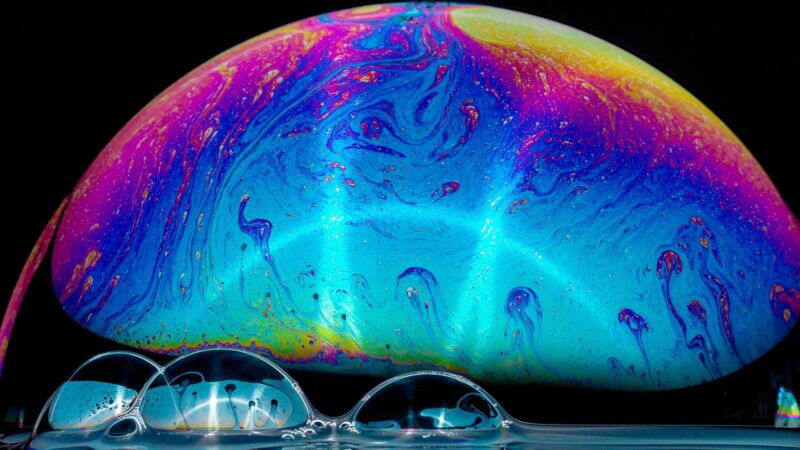NFTs are the hottest niche in crypto right now, last year was undeniably the year of NFTs. This year, NFTs have continued to pull all-time highs in volume while the rest of crypto is in a slump. This is no surprise given that iconic brands like McDonald’s, Nike, and Louis Vuitton have gotten into the NFT game. Social media giants like Twitter and Instagram have gotten involved as well, or they plan on it.
With all these bullish things going on why am I predicting that the NFT bubble will pop this year? It all comes down to this guy Gary Gensler, the current chairman of the SEC. It’s my thesis that he will bring down the ban hammer this year and single-handedly popped the NFT bubble.
To understand why we have to look at his backstory. Gary started off his career on wall street working at Goldman Sachs for 18 years, he then pivoted to public service where he did stints at both the Treasury Department and the CFTC under Clinton and Obama. Afterwards he once again did a pivot and went to academia where he taught courses on crypto and finance at MIT’s business school. Because he was super well versed in crypto, many people were excited when he was nominated as the next head of the SEC., We really thought that he understood us and that he would be the friendly one.
we were hopeful because the previous SEC was quite unfriendly to our industry. It was led by Jay Clayton who came into office in mid-2017 just as our massive bull run was about to take off. Those were the good old days when ETH and Bitcoin were rocketing, and ICOs were raising millions of dollars left and right. But then the SEC came in and said, “Stop right there, party’s over.” They started off by giving public warnings to projects and investors, but a few months later they whipped out the lawsuits, whacking big projects like Kik and Ripple. Their actions pretty much popped the ICO bubble, and that kicked off our long two-year bear market.
But wait a sec, what does this have to do with NFTs? Those aren’t securities, right? After all a Picasso painting is not regulated by the SEC. Well, you are absolutely right. NFTs that are digital art or pure collectibles are not regulated by the SEC. Things like Beeple’s art or CryptoPunks will always be fine and those are not the problem here. The problem is that people have started to take massive liberties and created NFTs that more resemble securities than pure art.
To understand what I meant, here are three examples to consider. First are fractional NFTs. This is where you take an NFT and split it up into a bunch of smaller pieces, the idea is that not many people can own a punk, which costs hundreds of thousands of dollars but if you split it up into like 10,000 pieces, then people can buy those and share in the upside of the punk. The problem is now you’ve taken something that’s non-fungible and turned it into a bunch of fungible tokens. Because each of those 10,000 pieces you cannot tell apart from each other, and that is very similar to issuing equity in something. Which is what the SEC is not okay with.
The second example is people adding a bunch of DeFi utility to NFTs. For example, some projects have promised to distribute all the royalties that they get to people who hold their NFTs. Lazy Lions is one of these, they had a DAO that NFT holders control, and they could vote to redistribute future profits to all holders. Another project worth noting is Buzzed Bears, who originally planned on letting people stake their NFTs to increase returns. They ended up putting that on hold after hearing some legal warnings. Which makes sense because we’re talking about access to future cash flow here. That’s smack dab in securities territory.
But I think the most egregious example is all these influencer NFT projects, where they put out these long road maps of everything they’re promising in the future. They’re like “Dude buy my NFTs! It’s gonna be worth it! We’re gonna build a game around it! There’s gonna be so much utility in the future!” and on and on. The way they market it is a huge red flag, and I think it’s easy to prove that they were selling securities because I see their followers post on twitter. Something like “Yeah I know this NFT was expensive, but I believe in xyz influencer.” So, this is the bet on them and that is a huge red flag if I’ve ever heard one. Because that’s straight up expectations of future profits.
Now if we really want to view these NFTs through the eyes of the SEC, we have to pull up the Howey Test, because that’s the tool that they used to determine whether or not something is a security.
The Howey Test was created way back in 1946 but the SEC continues to use it to this day. There are four prongs to it. All of which have to be satisfied for something to be considered a security. 1) an investment of money 2) in a common enterprise 3) with the expectation of profits 4) to be derived from the efforts of others.
Let’s apply this to these influencer NFT collections to see if it fits. Investment of money? Yes, because you’re buying their NFTs. In a common enterprise? Yes, because your interests are aligned with the interests of other NFT holders, and the team that created the collection. With the expectation of profit? Yes, look at how they market their NFTs. They’re promising to drive future value for people who buy their NFTs. And lastly, derive from the efforts of others? Yes, because the team is the one building the games, and they’re the ones creating all the future utility, and you are just sitting back relaxing and holding.
Obviously, I am not a lawyer so take what I say with a grain of salt, but personally it looks crystal clear to me that these NFTs with road maps are illegal and unregistered securities. Hester Peirce, who is one of five SEC commissioners, already gave us a stern warning about NFTs. She said that people were turning NFTs into products, that could definitely fall under the SEC purview. This is coming from the most crypto friendly commissioner in the SEC. We do call her crypto mom for a reason after all. So, if she’s telling us that we’re taking it too far, then we better pay attention, so that we’re not caught off guard at the band hammer drops one day.
Just for the record I am not hoping for a band hammer to come at all, but I do think it’s likely to come sometime this year. If I’m right, I think that is the pin that pops the NFT bubble. It would mean multiple big name NFT projects, returning the funds they collected and paying fines as well. It would also mean NFT marketplaces, delisting projects in droves, at least the ones that are on the security side of the spectrum.
After all we already saw OpenSea delist a project called DAO Turtles for openly promised a percentage of future sales to all turtle holders. For more proof of this delisting scenario, we can just look at the regular crypto world, where centralized exchanges avoid listing tokens that could be labeled as securities. Blockstack or stacks is the most apparent example of this. They made history by being the first SEC register ICO ever. They played by the rules, but by doing so they also explicitly admitted that theirs was a security token. That’s why they’ve had such a hard time getting listed on U.S. exchanges because those are not allowed to sell securities to retail investors like you and me.
If the SEC starts cracking down on certain NFT collections. I’m pretty confident we’ll see both mass delisting and projects being forced to return funds. Once again, I’m not cheering for this to happen. I really hope I’m wrong because I think this scenario would lead to a wider crypto bear market, that is what happened last time. We had a long bear market after the ICO bubble popped.
But I will admit that one thing I may be very wrong on is timing, my prediction is for the first domino to fall this year. But the SEC has actually been notoriously slow to do anything. Just look at Bitconnect, the infamous Ponzi scheme that crashed in early 2018. The SEC didn’t do anything against them until late 2021, when they charged some of the top promoters involved. It took them nearly four years to do anything about that, and Bitconnect is arguably the largest and most obvious infringement out there. That’s why we might not see any NFT projects get hit until late 2023, because the SEC just started looking at the NFT space a few months ago.
But here’s the thing, even if they do get hit it may not be all doom and gloom for those rule-breaking projects. Remember EOS and block.one, they raised a billion dollars in an unregistered ICO, and they ended up settling with the SEC for only 24 million dollars, a tiny fraction of their overall haul so that was only a slap on the wrist for them. And it’s that precedent of going easy on teams which may explain why there’s so many shameless people in crypto launching cash grabs and breaking the rules left and right. You may think I’m an NFT hater, but I promise you that is not true. I’m just sharing my analysis as best I can. I’m actually super bullish on the future of NFTs and I think they will evolve to have diverse utility besides just jpeg collectibles.








